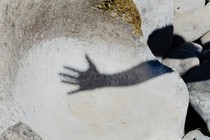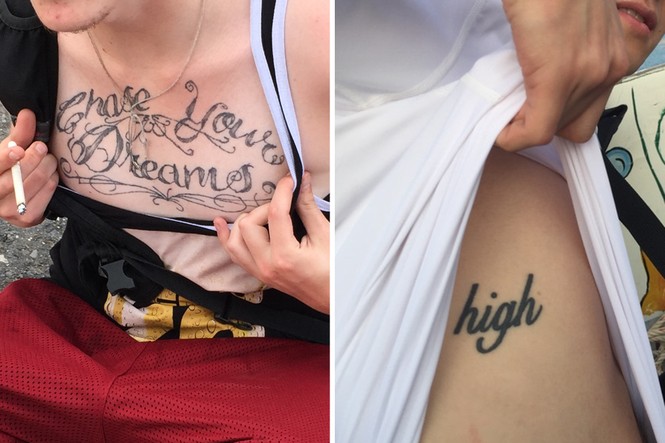The Words People Write on Their Skin
7 min read
You would have crossed the street to avoid this guy. He was big and brutal looking, with an evil stare. But there were words peeking out from below his T-shirt collar. Because I was curious to read what the tattoo said, I didn’t divert my path.
“What’s your tattoo?” I asked.
His face softened as he pulled down his collar to expose an encouraging Bible passage. “This is something my granny used to say to me every night before putting me to bed,” he said.
A taxi driver in Vienna, a one-armed Afghan refugee, had Blessed running down his neck.
A woman at a beach club in Buyukada, Turkey, had three young children at her side and a sentence that translates into “Sometimes the best things in life start out as mistakes” etched onto her waist.
A barber in Palermo had a straight-edged razor to my neck, and I made out Italian words on his forearm that mean “I love my life because my life is you.”
A young guy sitting next to me at an Amsterdam bar smiled shyly as he lifted a sleeve to show me a line on his right arm: “If you’re going through hell, keep going.” I asked him why. “We had just lost a child,” he said.
My interest in word tattoos inhabits the border between passion and obsession. It finds new subjects at every beach, every bar, every barbershop, every airport, every convenience store, every coffee shop, with every waitress, every refrigerator repairman, every phlebotomist. The fascination started when I noticed a small poem inked below the heart of a shirtless hiker and asked him about it. “My mom and I went out and had the same thing tattooed in the same place the morning that my little brother died,” he said. “It was his favorite poem.”
Soon I was photographing each word, phrase, and sentence I encountered. These tattoos helped me know the random passersby a little bit better and widened my world. The community of strangers living in my phone gallery grew until my daughter, Kaley, suggested I set up an Instagram account to showcase their pictures. I named it @noneofthemareyou, after a song about honoring personal uniqueness that caught my ear in the gym.
In all my requests to take a picture, I’ve had only one rejection. A woman lounging in a hot tub at a Palm Springs hotel had the single word Revolution running vertically down her spine. I noticed it while juggling a plate of melon and a freshly blended paloma and approached her from behind. Maybe I creeped her out. When I asked if I could photograph her word tattoo with my phone, she didn’t just say “No.” She said, “No fucking way.”
But she is the rarest of exceptions. Since I began photographing, I’ve learned that people who etch words onto their skin are almost uniformly eager to share. They’ve brought some of their deepest feelings permanently to the surface, and the messages are invitations to connect. Look at a word tattoo and you see what matters or what hurts. Word tattoos are billboards of confession, inspiration, aspiration, warning, or declaration of love.
I’m thinking of the young woman in a Boston laundromat who had the self-affirming word Beautiful atop her breasts or the young woman on a New Jersey beach who had her mother’s signature scrawled permanently across her flank. Or the guys I’ve met in Oakland with the 510 area code prominently on display, along with a list of family members and friends who have died in cross fire on the streets or military operations overseas.
I’m thinking of the teenager who serves me takeout at a Berkeley deli, with Grandma Lisa on his arm. “She’s the woman who took care of me until I got adopted,” he explained.
I’m a bit embarrassed to admit that I’ve never been inspired to tattoo any words on my body. I couldn’t imagine what words I would choose. To me, this is purely a spectator sport, and an excuse to connect with new people.
Sometimes, the tattoos are purposely obscure. After midnight, outside a Singapore bar, I spotted Hebrew letters on a local man’s upper arm. He told me that he wanted to tattoo the message “I am a complicated man, but it will all work out in the end”—in a language that no one around him would understand. On a small boat in the Gulf of Thailand, a young Korean tourist raised his shirt to show me the word High on his torso. “It’s because I like to get high,” he said.

Sometimes, word tattoos seem at odds with the mood that surrounds them. On a glorious spring afternoon in Philadelphia’s Rittenhouse Square, amid fragrant blossoms and the tender notes of a flutist playing Bach, a man sat alone on a bench rolling a cigarette, Man is too ignorant to exist emblazoned on his arm. Some 20 miles away, in a Dunkin’ parking lot, a kid with a cigarette dangling from his lips and a scowling, hopeless expression, showed me Chase Your Dreams on his chest.
I wondered what word tattoos I would find in Eagle Pass, Texas, the workaday border town that has become the epicenter of the immigration controversy. My friend Rusty agreed to fly with me to San Antonio and take the two-and-a-half-hour drive on a dead-straight highway. “You’re not really going to ask those guys if they have word tattoos,”Rusty said as I eased our rented Toyota 4-Runner up a dirt driveway that led to a gap in the border wall.
We met a bunch of middle-aged men and their boss, a brewery CEO who was unloading pallets of canned beer from the back of a 10-wheeler with a forklift, then stacking them to create an extension of the wall made of beer piles, for promotional footage. On his arm in thick block letters was Armed Forces Brewing Company, the name of his company. He posed, explaining that he had traveled from Virginia for Armed Forces Appreciation Day, the brewery’s promotional event to honor the members of the Florida Highway Patrol, the Texas National Guard, and others who have flocked to Eagle Pass to supplement the barbed wire, helicopters, and watercraft to defend the border.
Across town, in a strip-mall store that specializes in bobblehead collectibles, a bearded middle-aged man removed his shirt to reveal If necessary, will fight alone scratched across his shoulders. He attributes the slogan to the Apache chief Geronimo. Like Geronimo, the man is a Native American. He’s also a Marine vet who served in Desert Storm and spent five years in prison, charged with “conspiracy to transport aliens.” In his case, that should be anyone who’s not Native American, I assume.
In a barbershop close by, a barber finished trimming a Border Patrol agent and then pulled down his collar. I saw Show no Love. Love will Get you Killed. Another barber lifted his shirt to expose an elaborate religious scene and huge words: Fear No Evil, from the 23rd psalm.
I also encountered that phrase in another language. About an hour later, a man waiting to join the Armed Forces Appreciation Day festivities in Eagle Pass’s Shelby Park showed me the entire 23rd psalm, running down his right arm, in Hebrew. After surviving combat overseas, he flew to Tel Aviv to find an artist who could tattoo the words that had comforted him in battle, but in the psalm’s original language. He didn’t allow me to photograph his face.
Through my years of tracking word tattoos, “Fear no evil” and other references to Psalm 23 have been a constant. I recall walking back from dinner with colleagues on a warm Hong Kong night, and observing in an open-air bar a muscled local man with the words 23rd Psalm in Hebrew on his forearm. His buddy whipped off his shirt and showed me “Fear no evil” in Latin. They posed together.
The following night, in another bar on the same street, a young man displayed Family Comes First inked below his bicep. He seemed surprised that I didn’t recognize it as a line from the TV show Breaking Bad. He was far from his own family, which lives in Inner Mongolia’s second-largest city. He drank Brooklyn Lager and tried to cheer up his friend, who was slumped in the opposite seat, distraught by the news that his wife is expecting a second child. The responsibility of providing for the first child was already overwhelming him, and he was worried that the stress would cause him to become an abusive father, like his own was.
As we drank beer and shared a pizza, I found myself offering my own version of support. I was quoting the words I learned from the shoulder of a cheerful woman on the deck of the Larkspur Ferry in San Francisco Bay (Instructions for living a life: Pay attention. Be astonished. Tell about it). And the affirmation I gleaned from the skin just below the edge of spandex shorts on the guy in front of me at a Sausalito bike shop (Yes). And what I captured from the shin of a waitress in New Orleans (If not now, then when?) And what I see daily on the arm of my local barista (Life is a beautiful mess).
Soon the two friends and I were joking, and when I stepped into the men’s room, they surprised me by paying the bill. Outside, the Hong Kong street was jammed with revelers, and with limbs bearing messages that communicate across continents and cultures. We walked out into the crowd, and somehow we were slightly taller.



